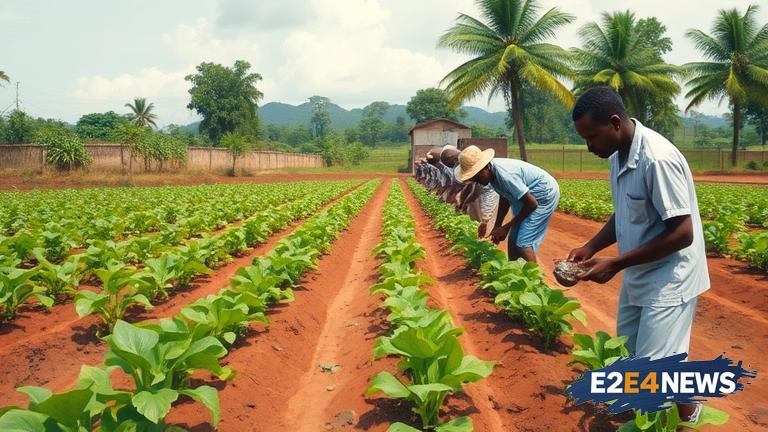The Ghana Prisons Service has initiated a groundbreaking farming project aimed at enhancing the nutritional well-being of inmates. This innovative endeavor is part of the service’s broader strategy to promote a healthier lifestyle and rehabilitation among prisoners. By engaging in large-scale farming, the Central Prisons seeks to increase food production, reduce reliance on external suppliers, and provide inmates with a more balanced diet. The project is expected to have a significant impact on the health and well-being of inmates, who will have access to fresh produce and nutritious meals. The farming project will also provide inmates with opportunities for skills training and employment, helping to equip them with valuable skills for life after release. Furthermore, the project will contribute to the country’s food security and sustainability goals, aligning with the government’s vision for a more self-sufficient and environmentally conscious Ghana. The Ghana Prisons Service has identified a suitable location for the farming project, which will be implemented in phases to ensure its sustainability and success. The project will involve the cultivation of a variety of crops, including staple foods such as maize, rice, and vegetables. In addition to improving inmate nutrition, the project will also help to reduce the financial burden on the prisons service, which currently spends a significant amount on food imports. The farming project is a testament to the Ghana Prisons Service’s commitment to rehabilitation and reintegration, recognizing that a healthy and balanced diet is essential for the physical and mental well-being of inmates. The project will be implemented in collaboration with relevant stakeholders, including the Ministry of Food and Agriculture, the Ministry of Health, and local farming communities. The Ghana Prisons Service has expressed its gratitude to the government and other partners for their support and assistance in making this project a reality. The project is expected to serve as a model for other prisons in Ghana, promoting a culture of sustainability and self-sufficiency within the corrections system. The farming project will also contribute to the United Nations’ Sustainable Development Goals (SDGs), particularly Goal 2, which aims to end hunger and achieve food security. Inmates will be involved in all aspects of the farming project, from planting to harvesting, providing them with a sense of purpose and responsibility. The project will also help to promote social cohesion and community engagement, as inmates work together to achieve a common goal. The Ghana Prisons Service has assured that the farming project will be monitored and evaluated regularly to ensure its effectiveness and impact. The project’s success will be measured by its ability to improve inmate nutrition, reduce food costs, and promote skills training and employment among inmates. The Ghana Prisons Service is confident that the farming project will have a lasting impact on the lives of inmates, helping to prepare them for a successful reintegration into society upon release. The project is a significant step forward in the country’s efforts to promote rehabilitation and reintegration, recognizing that a healthy and balanced diet is essential for the physical and mental well-being of inmates. The farming project will also help to reduce the risk of malnutrition and related health problems among inmates, promoting a healthier and more productive prison population. Overall, the Ghana Prisons Service’s farming project is a groundbreaking initiative that has the potential to transform the lives of inmates and promote a more sustainable and self-sufficient corrections system.
